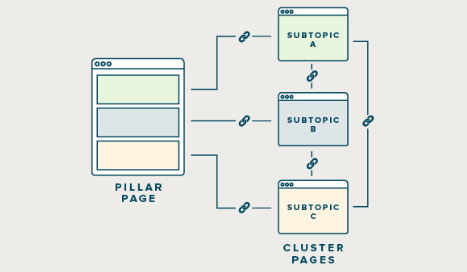The Ultimate Guide – How Topic Clusters Boost Your SEO and Organic Traffic Growth ?
Google’s way of ranking websites has changed. It now looks beyond just keywords and takes into account synonyms, related topics, and even answers to common user questions in your field. If your website has valuable, top-notch content that matches what users are searching for, it’s more likely to rank higher.
There are many ways to boost your SERP ranking. Using topic clusters is a great way to tell Google that your webpages are not only related to specific keywords but also more authoritative than your competitors.
What are Topic Clusters ?
Topic clusters are a group of related contents that collectively cover a broad subject area. It shows Google that a website has lots of useful content and is relevant to a specific subject.
A topic cluster is a strategic approach to organizing and linking related content on your website. It revolves around a central “pillar pages” that covers a broad topic. This pillar page serves as the nucleus of the content cluster, providing in-depth information and acting as a comprehensive resource for visitors.
Within the topic cluster, multiple supporting blog posts orbit around the pillar page, exploring specific subtopics in detail. These blog posts are linked to the pillar page and each other, creating a network of interconnected content that enhances user experience and search engine visibility.

A topic cluster consists of three components:
- Pillar page: Pillar pages are focused on broader subject areas and tend to target general industry keywords with higher search volume.
- Cluster pages: cluster content explores subtopics or common questions and will usually target long tail and less competitive keywords that have a semantic relationship with the piller page.
- Internal Links: Hyperlink that connects to other pages. Internal linking structure helps Google to understand the relevance, relationship and importance of interlinked pages.
Examples of Topic Clusters
The key to creating good topic clusters is to select a main topic that is broad enough to cover numerous related subtopics and to use hyperlinks to establish a strong relationship between the main topic and subtopics.
Here are a few examples of how topic clusters work:
- Pillar Topic: Digital Marketing
Cluster Subtopics: Search Engine Optimisation (SEO), Pay-Per-Click (PPC) Advertising, Social Media Marketing, Content Marketing, Email Marketing, Web Analytics.
- Pillar Topic: Home Improvement
Cluster Subtopics: Kitchen Remodelling, Bathroom Remodelling, DIY Projects, Interior Design, Exterior Home Maintenance, Landscaping.
What Are the Benefits of Topic Clusters?
The more high-quality content you create on a specific topic, the more keywords you can rank for. And the more relevant authority you can establish. Topic clusters not only help Google to understand your site as authoritative in specific subject areas, but they also assist Google understand your website’s hierarchy and how your content interrelates.
Topic Clusters helps to –
- Boost SEO and organic traffic
- Improve the user experience and engagements
How do Topic Clusters boost SEO and organic traffic?
The primary goals for Content cluster in SEO are:
- Attract traffic for long-tail, less competitive keywords through cluster content.
- Improve the ranking of the pillar content for more competitive keywords.
- Establish reputation in specific topic areas to get Google’s recognition as an industry expert.
Topic clusters can improve the structure and organisation of your website’s content, which can help SEO. You can develop a strong relationship between your core topic and subtopics by creating topic clusters, suggesting to search engines that your website is an authority on that subject. This authority can boost search rankings since search engines like websites with a clear and better structure.
Furthermore, a topic with the ability to open supporting topics can assure a diverse set of long- and short-tail keywords. This might increase the keyword relevancy of your website and help you rank better in search engine results pages.
Most new websites have a lower Domain Authority, making it difficult to rank for competitive keywords, even if their content is of high quality. Topic clusters, on the other hand, can help you rank for less competitive keywords and drive traffic in the short run. As the site’s authority rises, it will be able to target larger, more competitive keywords.
Overall, topic clusters can benefit your website’s SEO by offering a clear and ordered structure, increasing keyword relevancy, and establishing your website as an authority on a specific subject.
How Topic Clusters improve user experience and engagements?
While no one will audit your website or blame you for not using topic clusters. Topic clusters benefit both your visitors and the search engines that visit on your home page or any other inner pages.
Why do site visitors like Topic Clusters?
Your viewers will benefit from your site being organised in an easy-to-navigate and understandable manner. After all, your objective is to provide visitors with value, and putting them into a disorganised and poorly connected site isn’t that beneficial.
If you’ve ever visited a website with a bad layout or broken links, you definitely didn’t stay long—more on that in a second. Worse than your want to leave right away is the knowledge that you didn’t acquire the information you came for.
You’re not going to invest in the site’s products or service if it’s impossible to find what you’re looking for. User experience is often more important than SEO metrics.
On the other side, if you can read an informative post with several links to more resources, it’s easy to find more information if that’s what you’re looking for. Or, you could read the site’s pillar piece and leave the content with an answer and possibly with the intent to return to it. Both are beneficial to site ranking as well as consumer loyalty and engagement.
Why Search Engines like Topic Clusters?
Organizing your website using topic clusters demonstrates to search engines that you offer valuable content to online users. Interconnecting related articles showcases your expertise and your ability to address users’ search intent effectively.
Although it may seem somewhat arbitrary to select topics within your niche and group them together, this is a crucial aspect that search engines consider when determining your search rankings. Another critical factor to consider is session length, which refers to how long visitors stay on a particular page or your website overall.
Preventing users from quickly bouncing away from your site mere seconds after arriving is essential for improving your SEO performance. By strategically linking informative content to other relevant material, you can extend the amount of time visitors spend on your website.
Increasing your page session length is another metric that Google and other search engines use to evaluate your website, and it is viewed positively by them.
Conclusion:
Don’t hesitate any longer – transform your website into a comprehensive hub of information on the subjects that matter most to your audience. Topic clusters not only enhance your search engine rankings for user queries but also help visitors to search deeper into your content and interact more actively with your brand.
If you’re committed to expanding your online presence, give topic clusters a shot with the help of the best digital marketing Agency and witness the impact they can have on your online presence!

